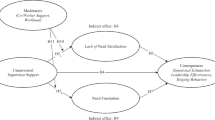Abstract
Organizational scientists have been investigating the role of human relationships vis-à-vis firm productivity for some years. Recently, Social Capital has been theorized to play a central part in the reduction of organizational transaction costs. We briefly position Social Capital among several theories claiming a role for interpersonal capital, review its theoretical nuances, and test this theoretical structure using a sample of 469 sales professionals from a leading medical services firm. Our findings indicate that trust, communication, and employee focus have significant direct and moderate indirect affects on organizational commitment.
Similar content being viewed by others
REFERENCES
Barnard, C. (1938). The Functions of the Executive. Cambridge, MA: Harvard University Press.
Becker, G. (1964). Human Capital. New York: National Bureau of Economic Research.
Belliveau, M., O'Rielly, C. and Wade, J. (1996). Social capital at the top: effects of social similarity and status on CEO compensation. Academy of Management Journal, 29(6), 1568–1593.
Berger, P. and Luckman, T. (1966). The Social Construction of Reality. New York: Doubleday.
Blau, P. (1964). Exchange and Power in Social Life. New York: Wiley.
Bourdieu, P. (1977). Outline of a Theory of Practice. Cambridge, UK: Cambridge University Press.
Brehm, J. and Rahn, W. (1997). Individual-Level Evidence for the Causes and Consequences of Social Capital. American Journal of Political Science, 41(3), 999–1023.
Burt, R. (1997). The Contingent Value of Social Capital. Administrative Science Quarterly, 42, 339–365.
Chung, L and Gibbons, P. (1997). Corporate Entrepreneurship: The Roles of Ideology and Social Capital. Group and Organization Management, 22(1), 10–30.
Cobb, A. and Wooten, K. (1998). The Role Social Accounts Play in a “Justice Intervention.” In R. Woodman and W. Passmore (Eds.), Research In Organizational Change and Development (Vol. 11), 243–295. Greenwich, CT: JAI Press.
Cohen, S., and Fields, G. (1999). Social Capital and Capital Gains in Silicon Valley. California Management Review, 41(2), 108–130.
Coleman, J. (1988). Social Capital in the Creation of Human Capital. American Journal of Sociology, (94) Supplement, 95–120.
Cullen, J. and Victor, B. (1993). The Effects of Ethical Climate on Organizational Commitment: A Multilevel Analysis. Unpublished manuscript.
Doney, P., Cannon, J., and Mullen, M. (1998). Understanding the Influence of National Culture on the Development of Trust. Academy of Management Review, 23(3), 601–620.
Friedman, R., and Krackhardt, D. (1997). Social capital and career mobility. Journal of Applied Behavioral Science, 33(3), 316–334.
Fukuyama, F. (1995). Trust: The Social Virtues and the Creation of Prosperity. New York: Free Press.
Gouldner, A. (1959). Reciprocity and Autonomy in Functional Theory. In L. Gross (Ed.), Symposium on Sociological Theory. New York: Harper and Row.
Homans, G.C. (1964). Social Behaviour: Its Elementary Forms. New York: Harcourt Brace.
Jary, D., and Jary, J. (1991). The Harper Collins Dictionary of Sociology. New York: Harper Collins.
Kawachi, I., Kennedy, B., Lochner, K., and Prothrow-Smith, D. (1997). Social Capital, Income Inequality and Morality. American Journal of Public Health, 87(9), 1491–1498.
Leanna, C., and Van Burren H. (1999). Organizational Social Capital and Employment Practices. Academy of Management Review, 24(3), 538–555.
Lewicki, R., McAllister, D. and Bies, R. (1998). Trust and Distrust: New Relationships and Realities. Academy of Management Review, 23(3), 438–458.
Mathieu, J., and Zajac, D. (1990). A Review And Meta Analysis of the Antecedents, Correlates and Consequences of Organizational Commitment. Psychological Bulletin, 171–194.
Merton, R.K. (1957). Social Theory and Social Structure (2nd ed.). Glencoe, IL: Free Press.
Meyer, J., and Allen, N. (1997). Commitment in the Workplace. Thousand Oaks, CA: Sage.
Morow, P. (1983). Concept Redundancy in Organizational Research: The Case of Organizational Commitment. Academy of Management Review, 8(2), 486–500.
Mowday, R., Porter, T., and Steers, R. (1982). Employee-Organizational Linkages. New York: Academic Press.
Mowday, R., and Steers, R. (1979). The Measurement of Organizational Commitment. Journal of Vocational Behavior, 14(1), 224–227.
Nahapiet, J. and Ghoshal, S. (1998). Social Capital, Intellectual Capital, and the Organizational Advantage. Academy of Management Review, 23(2), 242–285.
Northcraft, G., and Neale, M. (1994). Organizational Behavior, 2nd Ed. New York: Dryden.
Pennings, J., Lee, K., and Van Witteloostujin, A. (1998). Human Capital, Social Capital, and Firm Dissolution. Academy of Management Journal, 41(4), 425–440.
Pondy, L., and Mitroff, I. (1979). Beyond Open Systems Models of Organization. In B. Staw (Ed.), Research In Organizational Behavior (Vol. 1, pp. 3-39). Greenwich, CT: JAI.
Portes, A. (1998). Social Capital: Its Origins and Applications in Modern Sociology. Annual Review of Sociology, 24, 1–24.
Portes, A., and Landolt, P. (1996). The Downside of Social Capital. The American Prospect, May-June, 1996 (pp. 18–26).
Putnam, R. (1995). Bowling Alone: America's Declining Social Capital. Journal of Democracy, 10(January), 24–35.
Ravlin, E., and Meglino, B. (1987). Issues of Work Values Measurement. Research in Corporate Social Performance and Policy (Vol. 9), 153–183.
Reichers, A. (1985). A Review and Reconcpetualization of Organizational Commitment. Academy of Management Review, 10(2), 465–476.
Robinson, S. (1996). Trust and Breach of the Psychological Contract. Administrative Science Quarterly, 41(3), 574–599.
Rouseau, D. (1995). Psychological Contracts in Organizations: Understanding Written and Unwritten Agreements. Thousand Oaks, CA: Sage.
Rousseau, D., Sitkin, S., Burt, R., and Camerer, C. (1998). Not So Different Afterall: A Cross Discipline View of Trust. Academy of Management Review, 23(2), 393–404.
Sheppard, B., and Sherman, D. (1998). The Grammars of Trust: A Model and General Implications. Academy of Management Review, 23(3), 422–437.
Starbuck, W. (1983). Organizations as Action Generators. American Sociological Review, 48(1), 91–102.
Steers, R. (1977). Antecedents and Outcomes of Organizational Commitment. Administrative Science Quarterly, 22, 46–56.
Treviño, L., Butterfield, K., and McCabe, D. (1998). The Ethical Context of Organizations: Influences on Employee Attitudes and Behavior. Business Ethics Quarterly, 8(3), 447–476.
Weick, K. (1995). Sense Making in Organizations. Thousand Oaks, CA: Sage.
Author information
Authors and Affiliations
Rights and permissions
About this article
Cite this article
Watson, G.W., Papamarcos, S.D. Social Capital and Organizational Commitment. Journal of Business and Psychology 16, 537–552 (2002). https://doi.org/10.1023/A:1015498101372
Issue Date:
DOI: https://doi.org/10.1023/A:1015498101372




